Metternich's
Full Set of Names and
Titles
Klemens
(also
Clemens or
Clement)
Wenzel
(also
Wenceslaus or
Wenceslas)
Nepomuk Lothar,
Earl and Prince von Metternich-Winneburg-Beilstein
Duke Portella, Earl of Königswart (Kynzvart)
Knight of the Golden Fleece, Grandee of Spain First Class,
His Imperial Royal
Majesty's Privy Councilor,
Court Chamberlain, Court Chancellor,
Cabinet Minister,
Minister of Foreign Affairs, Prime Minister of
the Empire
Metternich in a Nutshell
Austrian Chancellor
Metternich was one of the most capable diplomats of his time. He even outwitted
 Napoleon, a fact he
didn't fail to boast about, and wouldn't you? The only man
in his line of work who could be considered Metternich's equal was
Napoleon, a fact he
didn't fail to boast about, and wouldn't you? The only man
in his line of work who could be considered Metternich's equal was
 Talleyrand.
Talleyrand.
In the end, however, Metternich
failed because his basic strategy was to support
 autocracy,
whereas the general political development in Europe,
especially after the
autocracy,
whereas the general political development in Europe,
especially after the
 French
Revolution, moved rapidly towards
French
Revolution, moved rapidly towards
 democracy.
democracy.
See also
 Forms of Government.
Forms of Government.
In his Metternich biography, Alan Palmer sums up
Metternich's remarkable political longevity:
In 1790 he
[Metternich] performed official duties during the coronation of
Leopold II as Holy Roman Emperor of the German Reich; and in
1859 his advice on questions of war and peace was still being
sought by Leopold's great-grandson, Francis Joseph.
Alan Palmer Metternich,
1972
Metternich's Appearance
When entering a room, some women
folk noticed Metternich's good looks. He was poised and of
course very bright. He had elegance, courtesy, and good
taste.
Who Was in Charge at the Time?
In Metternich's lifetime, the
following emperors ruled Austria:
See also
 Holy Roman Empire and
Holy Roman Empire and
 Governments of Austria.
Governments of Austria.
Metternich's Family
and Background
The tiny village of Metternich
was named after Klemens' ancestors. Here it is:
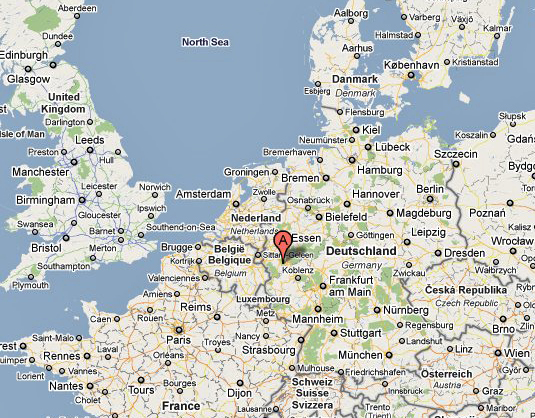
Map Location
of Metternich, Euskirchen District,
North Rhine-Westphalia, Germany
Google map
The House of Metternich was of ancient and solid German nobility,
with headquarters located in the beautiful lands along the Rhine
River. Their family tree goes back to
 Henry I the Fowler.
Henry I the Fowler.
The Metternich dynasty spread
its procreation through twelve lines. Klemens von Metternich
was a descendant of the youngest family branch, and the last
one not extinct, the line of Winneburg-Beilstein.
Hence, Klemens von Metternich was the prince (German: Fürst)
of Metternich-Winneburg zu Beilstein.
Both, Winneburg and Beilstein
Castle, were already in ruins when Klemens von Metternich
was born. But we get an idea of Metternich's background and
his family's former glory. Here are photos of what's left of
the former castles:
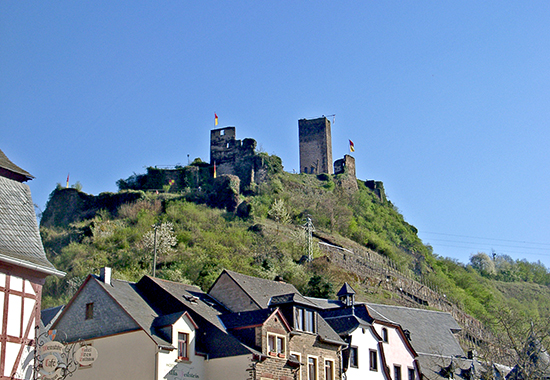
Castle
Metternich at Beilstein (Mosel) in Germany
Photo: Klaus Graf
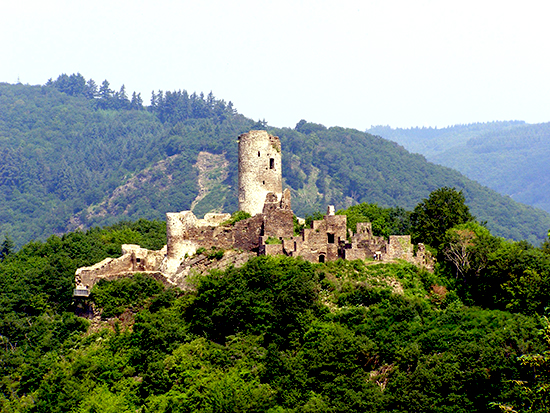
Winneburg
Castle, Cochem (Mosel) in Germany
Photo: Thomas Krämer
How come Metternich was the
Earl of Königswart?
Because one of his ancestors,
Heinrich Metternich, became
owner of Königswart after having successfully fought in the
 Battle of the White Mountain in
1620, which was part of the
Battle of the White Mountain in
1620, which was part of the
 Thirty Years' War.
Thirty Years' War.
Konigswart is located 160 miles
north-west of Vienna.
Here she shines:
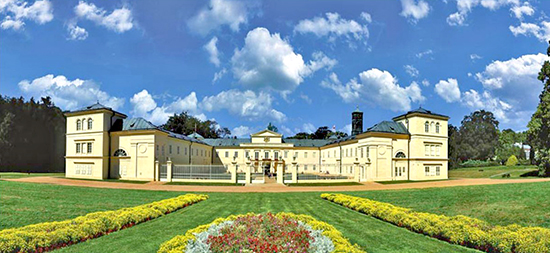
Koenigswart Castle,
now in the Czech Republic
Photo: Bohemia
Františkovy Lázně
Metternich's Father
Klemens von Metternich's father was
the Count (German:
Graf) and later Prince (German: Fürst)
Franz Georg Karl von Metternich (also: Francis George
Charles von Metternich.)
He lived from March 9, 1746
until August 11, 1818,
and was apparently of stout appearance.
Born at Koblenz, Germany, he
was a diplomat in the services of the Archbishop of Trier (or in
French: Trèves.)
In 1774, he switched employers and became
Austria's ambassador to the Rhenish electors, representing the
Viennese Court in general, and
 Holy Roman Emperor Joseph II (son
of
Holy Roman Emperor Joseph II (son
of
 Maria Theresa)
in particular.
Maria Theresa)
in particular.
In 1791, under the Duke Albert von
Sachsen-Teschen and Archduchess Christine, Franz von Metternich was
directing minister for the Netherlands. And again from 1793-1794,
after the re-conquest of Belgium under Archduke Carl, until after
the
 Battle of Fleurus the
Netherlands had been lost for the second time.
Battle of Fleurus the
Netherlands had been lost for the second time.
From 1810, and in the absence of his son Klemens,
he held the fort at the Austrian ministry of foreign
affairs.
Metternich Sr. died at Vienna.
Summing up father Franz, Alan Palmer leaves his velvet gloves in the
drawer:
In many ways he
was typical of the eighteenth-century aristocracy in a petty
state except that he had even less common sense than most of his
fellow nobles and much more money to fritter away.
Alan Palmer Metternich,
1972
Metternich's Mother
Klemens von Metternich's mother was the
smart and witty Countess (German:
Gräfin) Maria Beatrix Aloisia (Marie
Beatrice Eloise) von
Kagenegg (also spelled Kageneck.) At the imperial
residence in Vienna, Countess Beatrice was not a stranger.
She already had been a countess before she
married Franz von Metternich. In fact, with regards to climbing the
nobility ladder, Franz gained much more from this marriage than did
Beatrice.
Although German, correspondence between Mother Beatrice
and Son Klemens, by the way, was always conducted in French.
It was thanks to Beatrice and her
mixture of spunk and intellect that the Metternich's not only
recovered after 1794, but came to more prominence than ever. How did
she do it? By arranging a marriage between her son Klemens and
Eleonore von Kaunitz, grand-daughter of "Austria's greatest
statesman of the century," the famous chancellor Kaunitz.
Metternich's Siblings
Father Franz von Metternich and Mother Beatrice von Kagenegg married in
January 1771. Beatrice was 15 or 18 years old at the time. The
couple had
four children.
Metternich's elder sister
Marie Pauline Kunigunde Walpurge
was born on November 29, 1771. She died in 1855.
Klemens was their
second child, born May 15, 1773. He died in 1859.
Metternich's younger brother
Joseph was born on November 4,
1774. He died in 1830.
A fourth child, a son, was born in
1777 but died soon after, in 1778.
Metternich's Wives and
Children
Klemens von Metternich married three
times and had affairs more often than that.
|
First
Marriage |
On September 27, 1795,
Metternich married the Countess Eleonore
von Kaunitz, born in October 1775, and hence 19 years old at the time.
She was the only daughter of Count Ernst Christoph von
Kaunitz. Father Kaunitz was a prominent diplomat, a fan of all things
Mozart, and the son of the highly influential Austrian chancellor
Count Wenzel Anton von Kaunitz.
This marriage had been arranged by Metternich's mother
Beatrice. For Klemens, this wedding meant great estates in Austria, vast wealth, and an
open door to the top Viennese nobility. Hence, the motivation for
this union was just that, not love. However, Klemens managed to grow
feelings of genuine affection and respect for her.
Eleonore was the plain looking type,
but she was in love.
Eleonore's father was less than
thrilled, finding Klemens too shallow, mother Beatrice's schemes
obnoxious, and the presence of Klemens Senior just unbearable,
unless the latter kept his mouth shut. But he eventually gave in
under the condition that young Metternich wouldn't work as a
diplomat as long as he, Kaunitz, was alive. Klemens promised and
kept his word. Ernst Christoph von Kaunitz
died in 1797.
Metternich's seven children with Eleonore
were:
- Marie (Maria Leopoldina), born on
January 17, 1797
- Francis Charles, born
in
February 1798, died in November 1799 (lung infection)
- Clement, born
in
June 1799, died a few days later
- Victor Ernst Francis Lothar Clemens
Joseph Adam, born on January 12, 1803
- Clementine
- Leontine Adelheid Marie Pauline,
born June 18, 1811
- Hermine Gabriele Marie Eleonore
Leopoldine, born September 1, 1815
The first five children preceded their
father in death. Wife Eleonore died on March 19, 1825. |
| |
|
|
Second
Marriage |
On November 5, 1827, Metternich
married his second wife, the Baroness Marie
Antoinette von Leykam, Countess von Beilstein. Antoinette
(or Antonie) died on January 17, 1829.
Metternich's child with Marie was:
- Richard Clemens Lothar, born January
7, 1829. He became Austrian ambassador in Paris from 1859-1871.
Richard survived his father and died in 1895. |
| |
|
|
Third
Marriage |
Metternich's third wife was the
Countess Melanie Zichy-Ferraris,
who died March 3, 1854.
Metternich's children with Melanie
were:
- Paul, who lived 1834-1906
- Lothar, who lived 1837-1904 |
One of Metternich's mistresses was Napoleon's sister,
 Caroline Murat.
Caroline Murat.
One of Metternich's illegitimate
children was Clementine.
Klemens von Metternich — The Early
Years
Metternich was born at Coblenz
(German: Koblenz) in 1773. At the time, the map of Europe looked
something like this:
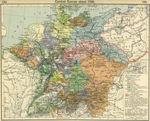
1786
Central Europe
Click map to enlarge
You can find Coblenz on the same
map, look for the square "Dc":
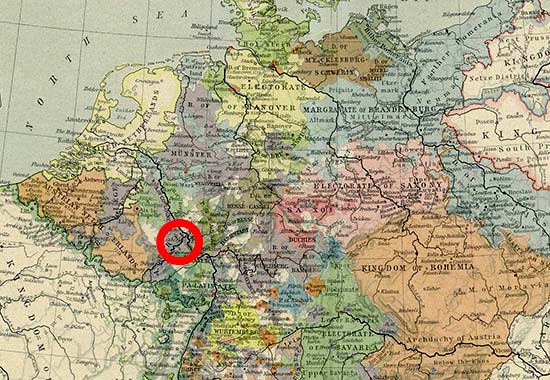
Map Location of
Coblenz, Germany
Click map to enlarge.
As illustrated on the map, Coblenz was part of the
Archbishopric of Trèves (German: Trier.)
Metternich's Trier and Coblenz
Trier
Ancient Trier (aka Treveris, or
Augusta Treverorum, or Trèves) stomping grounds of a Germanic tribe, or
more to the point, a Belgic tribe, the
Treveri, became an
official Roman town around 15 BC. Moreover, it became the capital of Belgica, the Rome of the West. Roman emperor
Valentinian II was born here at
Trier in AD 371.
Trier became an archbishopric in
815, and its archbishops became powerful princes within the realm of
the Holy Roman Empire. Metternich Sr. was working for the archbishop
of Trier before he (or, more probably, his wife for him) could secure
employment in the services of the Austrian Emperor.
Coblenz
Coblenz is one of the oldest cities in Germany. Founded by the
Romans in 9 BC it was named Confluentes, because here the
rivers Rhine and Moselle, or Mosel, meet.
By the time of Metternich's birth, the
Coblenz administration had been a little bit neglected. In 1774,
the town chronicler was appalled and referred to the general
state of the municipal archives as "a pig sty." This problem
seems to have been resolved by the year 1805.

Deutsches Eck (German
Corner) at Koblenz, Germany,
Where the Rivers Rhine and Mosel Meet
KoblenzTouristik
In the early 1780s, Coblenz had about
12,000 inhabitants.
Should you decide to visit Coblenz,
ask your cab driver to get you to Münzplatz 8, where you will find
House Metternich, Metternich's birthplace.
This house was built in 1674. Actually, it was the birthplace of all
of Franz and Beatrice von Metternich's four children.
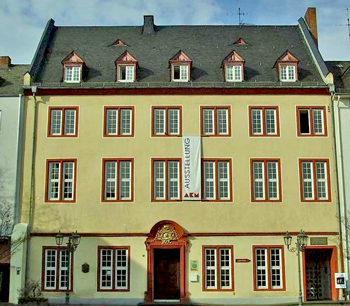
House Metternich,
Koblenz
wiki
Metternich's Education
— The Early Years
The Metternichs were Catholic. However, young
Klemens was tutored by the Catholic Abbé Bertrand and the Protestant
Johann Friedrich Simon (John
Frederick Simon) who would become a member of the
 Jacobine Club.
Jacobine Club.
The early years in Coblenz ended when
both tutors accompanied Klemens and Joseph to enroll at the
university of Strasbourg.
One of Klemens'
instructors at Strasbourg was Professor Koch, who taught law, politics, and the
history of revolution.
While Metternich studied at Strasbourg, the
 French Revolution
broke out in Paris. The riot wave reached Strasbourg and a mob pillaged
its town hall. But order was
restored the same day.
French Revolution
broke out in Paris. The riot wave reached Strasbourg and a mob pillaged
its town hall. But order was
restored the same day.
Nevertheless, due to the revolutionary
spirit at and around Strasbourg, Metternich switched to Mainz
university shortly after, where he was educated in all things
politics and diplomacy by Professor Nicholas Vogt.
Metternich spent the vacations with
his father at Brussels, then Austrian Netherlands, where he found employment at the
Chancery, his father's workplace.
Metternich the
Conservative Politician
Growing up, Metternich witnessed the
unrest of the French Revolution. This, in combination with his
education and heritage, left him very much opposed to, and almost
traumatized by, revolutionary ideas. He became an advocate of conservative values.
Metternich's political career kicked
off with the Congress of Rastatt in December 1797. He attended in
his capacity as representative of the Westphalian counts and was
thoroughly bored.
Metternich and
Napoleon
Metternich deemed the French emperor
an ambitious upstart, which makes sense considering a comparison of
background and upbringing of the two men.
Yet,
 Napoleon managed to keep
Metternich on his toes by confiscating his holdings and his workers in
1796, and requesting his services as ambassador to France in 1806.
Although Metternich hated Napoleon's guts, he complied, and his
stiff upper lip was admired by many a compatriot.
Napoleon managed to keep
Metternich on his toes by confiscating his holdings and his workers in
1796, and requesting his services as ambassador to France in 1806.
Although Metternich hated Napoleon's guts, he complied, and his
stiff upper lip was admired by many a compatriot.
In 1806, the
 Holy Roman Empire came to an
end. Its last emperor,
Holy Roman Empire came to an
end. Its last emperor,
 Francis
II, was renamed Francis I and kept on as Emperor of Austria.
Francis
II, was renamed Francis I and kept on as Emperor of Austria.
When put together in a room, it was Napoleon who became unnerved by
Metternich first. Strong emotions and pretentious ambitions ran into
an unyielding brick wall of indifference. Such was the case on August
15, 1808, when the two met at Saint-Cloud.
Metternich and the
Austrian War
In May 1809, Napoleon's troops
occupied Vienna, starting the
 Austrian War. On May 21
- 22, 1809, the Austrians fought back and won the
Austrian War. On May 21
- 22, 1809, the Austrians fought back and won the
 Battle of Aspern-Essling.
Battle of Aspern-Essling.
It was Napoleon who had the last word,
winning the
 Battle of Wagram, which was
fought July 5 - 6, 1809.
Battle of Wagram, which was
fought July 5 - 6, 1809.
But Napoleon could spot and appreciate diplomatic skill. Thus, he
made Metternich Minister of State in August 1809 and Minister of
Imperial Affairs and Foreign Affairs in October 1809.
On October 14, 1809, Austria was
forced to stand up for her loss in the Austrian War and cede
extensive territories by signing the humiliating
 Treaty
of Schönbrunn.
Treaty
of Schönbrunn.
Nonetheless, the cumulative events and their outcome, and the role
he played in it, did a number on Metternich. According to
contemporaries, Metternich became very aware of his diplomatic
influence and power, and could sometimes come across a little brusque and snippy.
How was he able to maintain such an
attitude? Austria had just lost a
war. What was up his sleeve?
Metternich knew of Napoleon's
desperate wish to be linked to a real royal dynasty after having
been divorced from
 Josephine. Archduchess
Marie Louise, eldest daughter of
Francis I, came in handy. Metternich arranged things accordingly and
the two married on April 1, 1810.
Josephine. Archduchess
Marie Louise, eldest daughter of
Francis I, came in handy. Metternich arranged things accordingly and
the two married on April 1, 1810.
What is The Age of
Metternich?
Thirty-three of Metternich's
thirty-nine years in office as foreign minister for the Austrian
Empire are also called the Age of Metternich.
He was foreign minister from 1809 to
1848. The Age of Metternich refers to the years 1815 to 1848.
Klemens von Metternich
— Timeline
Wednesday,
May 15, 1773 |
Birth at Koblenz, Germany |
| |
|
|
November 29, 1780 |
 Maria Theresa dies
Maria Theresa dies |
| |
|
|
Midsummer 1786 |
Visit at Königswart |
| |
|
|
August 17, 1786 |
 Frederick the Great dies
Frederick the Great dies |
| |
|
|
November 12, 1788 - 1790 |
Enrolls at University of
Strasburg (Strasbourg) together with his brother Joseph. |
| |
|
|
July 14, 1789 |
Storming
of the
 Bastille. Outbreak
of the
Bastille. Outbreak
of the
 French Revolution French Revolution |
| |
|
|
July 21, 1789 |
News of
the revolution have arrived at Strasbourg. A mob storms
town hall. But it will be all under control again by
tomorrow morning. |
| |
|
|
November 1789 |
Unrest in
the Austrian Netherlands in form of the
 Brabant
Revolution. The locals want to get rid of
the Austrian rule. Brabant
Revolution. The locals want to get rid of
the Austrian rule.
Here are the Austrian
Netherlands on a map, see squares BC-III/IV:
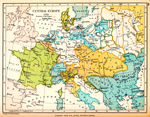
Central
Europe 1789
Click map to enlarge |
| |
|
|
January 11, 1790 |
The rebels proclaim independence and
a United States of Belgium. |
| |
|
|
February 20, 1790 |
 Joseph II dies
Joseph II dies |
| |
|
|
September 1790 |
Metternich
leaves
Strasbourg for Frankfurt. |
| |
|
|
October 9, 1790 |
Master of
Ceremonies (Marshal to the Catholic Bench of the College
of the Counts of Westphalia) at
 Leopold II's coronation at Frankfurt. Also present was
his father, Franz
von Metternich. Leopold II's coronation at Frankfurt. Also present was
his father, Franz
von Metternich. |
| |
|
|
1790 |
Studies at
University of Mainz. |
| |
|
|
December 30, 1790 |
Austria
has crushed the Brabant Revolution and order is
established. Father
Franz is appointed Minister Plenipotentiary to the
States General of the Austrian Netherlands.
What's a Minister Plenipotentiary?
An envoy or ambassador deputed by his sovereign to act
at his own discretion. Ergo full authority for Franz.
Palmer thinks he was not suited for the job. |
| |
|
|
June 21, 1791 |
 Louis XVI tries to
flee the country but gets caught at Varennes and is
brought back to Paris.
Louis XVI tries to
flee the country but gets caught at Varennes and is
brought back to Paris. |
| |
|
|
July 1791 |
Father Franz
arrives at his new desk in Brussels. |
| |
|
|
August 27, 1791 |
 Declaration of Pillnitz
Declaration of Pillnitz |
| |
|
|
March 1, 1792 |
 Leopold II
dies.
Leopold II
dies. |
| |
|
|
April 20, 1792 |
France
declares war on Austria. This is the
 War of the First Coalition.
The
War of the First Coalition.
The
 French Revolutionary Wars
have begun.
French Revolutionary Wars
have begun. |
| |
|
|
July 14, 1792 |
Metternich
acts as Master of
Ceremonies (Marshal to the Catholic Bench of the College
of the Counts of Westphalia) at
 Francis II's coronation,
at Frankfurt. Coincidentally (or was it?), this day was
the third anniversary of the fall of the Francis II's coronation,
at Frankfurt. Coincidentally (or was it?), this day was
the third anniversary of the fall of the
 Bastille.
Bastille. |
| |
|
|
Summer of 1792 |
Ends
studies at the university of Mainz. Travels back to
Coblenz. |
| |
|
|
July 30, 1792 |
The
Prussians, Austria's ally, leave Coblenz direction
Paris. |
| |
|
|
Fall 1792 |
Metternich
arrives at Brussels. |
| |
|
|
October 1792 |
The French
take Worms, Mains, and Frankfurt. |
| |
|
|
November 6, 1792 |
 Battle of Jemappes Battle of Jemappes
After this defeat, the
Austrians evacuate Brussels. The Metternichs flee first
to Roermond, then to Coblenz. |
| |
|
|
March 1, 1793 |
Austrian
counter-offensive begins, led by the
 Prince
of Coburg. Prince
of Coburg. |
| |
|
|
Early Spring 1793 |
The
Metternichs are back in Brussels. |
| |
|
|
April 2, 1793 |
 Dumouriez arrests
the French commissioners that were ordered by the French
government to arrest him and sends them to Metternich Jr. for questioning.
Dumouriez arrests
the French commissioners that were ordered by the French
government to arrest him and sends them to Metternich Jr. for questioning. |
| |
|
|
April 5, 1793 |
 Dumouriez
and
Dumouriez
and
 Louis-Philippe defect to the Austrians, confirming Metternich's
conservatives values.
Louis-Philippe defect to the Austrians, confirming Metternich's
conservatives values. |
| |
|
|
Early Spring 1794 |
Metternich
travels to
London, accompanying Count
Desandrouin, treasurer of the Belgian
Provinces, who comes to England to negotiate a British
loan.
This trip
introduces Metternich to British high society.
Interestingly, he thinks
the Prince of Wales (later king
George IV) is one of
the most handsome men he ever saw. |
| |
|
| June 26, 1794 |
 Battle of Fleurus.
Important French victory. For
the next twenty years, France,
instead of Austria, will occupy
the Low Countries. Battle of Fleurus.
Important French victory. For
the next twenty years, France,
instead of Austria, will occupy
the Low Countries.
While still at London, twenty-one year-old Metternich receives news that he
is appointed as the Emperor's Minister Plenipotentiary
to the United Netherlands at the Hague.
After the Austrian defeat at
Fleurus, Brussels will be
consequently abandoned by the
Austrians. Metternich Senior
will flee from Brussels to
Dusseldorf. |
| |
|
| July
19, 1794 |
The Austrian Emperor informs
Metternich Senior, who is now at Dusseldorf, that he has
dissolved the administration of
the Austrian Netherlands.
In addition, the Emperor blames
Metternich Sr for the latest
setbacks in Belgium. His Majesty
had visited Brussels that spring
and was not at all impressed by
Metternich's administration.
Emphasized as a particularly
stupid idea was Metternich's
decision to arm the peasants so
that they could help fighting
the invaders, which completely
backfired. |
| |
|
|
August 1794 |
Metternich Jr, still at London, issues his
first publication, a pamphlet in which he argues for
political conservatism and the general arming of the
population in order to fight the Revolution. Thus trying
to defend his father's policy, Klemens von Metternich
will also have to share the criticism that came his
father's way. |
| |
|
|
September 1794 |
Metternich
leaves Harwich for Den Haag where he has to search for a
month for the guys he is supposed to be
working with. The Austrian government had left the
Austrian Netherlands. |
| |
|
|
October 1794 |
The
Metternichs (father and mother, not Klemens) travel to Vienna
to avoid the French. |
| |
|
|
October 23, 1794 |
The
French take Metternich's
home-town Coblenz. All of the
Metternich estates (except
Konigswart, of course) are
confiscated. |
| |
|
|
Mid-November 1794 |
Klemens von Metternich joins his
parents at Vienna. Generally
perceived as a little bit too
ambitious, and with the
Emperor's latest bad review in
their knapsack, the Metternichs
don't have many friends in high
places at Vienna, nor do they
have employment in His Majesty's
services. This social ice age
will last for nearly two years. |
| |
|
|
Early 1795 |
The
Austrian Emperor allocates a pension for Metternich Sr.
to compensate for lost estates in the Rhineland. |
| |
|
|
September 27, 1795 |
At
Austerlitz, Clemens von Metternich marries his first wife,
Eleonore von Kaunitz. |
| |
|
|
Winter 1795 / 1796 |
Clemens
and Eleonore von Metternich spend the winter at the
Kaunitz town residence in Vienna.
During these months,
Clemens might or might not have seriously continued his
studies in Geology, Physics, and Chemistry. |
| |
|
|
December 8, 1795 |
Clemens
and Eleonore von Metternich give their first grand
reception and dinner. |
| |
|
|
January 17, 1797 |
Birth of
daughter Marie Leopoldine von Metternich. |
| |
|
|
May 19 (or September) 1797 |
Death of
father-in-law Ernst Christoph
von Kaunitz.
(In his Memoirs,
Metternich writes, "In the autumn of 1797, death carried
off my father-in-law." Palmer reads, "But in September
1797... Prince Kaunitz suddenly fell ill and died.") |
| |
|
|
October 17, 1797 |
 Peace of Campo Formio.
Austria is forced to agree to the French
possession of the Rhineland. France wins the
Peace of Campo Formio.
Austria is forced to agree to the French
possession of the Rhineland. France wins the
 War
of the First Coalition. War
of the First Coalition.
Here is the map:
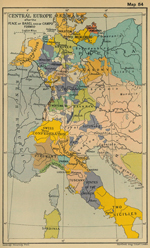
Central
Europe after the Peace of Basel (1795)
and of
Campo Formio (1797) |
| |
|
| |
|
December 9, 1797 -
April 23, 1799 |
Rastatter Friedenskongress
(Congress of Peace at Rastatt)
The French had taken the lands on
the left bank of the Rhine River. The Congress was
convened in order to negotiate recompense for the German
princes who lost these lands.
Metternich Sr. was chosen as Imperial Plenipotentiary.
He brings his son, Metternich Jr., along as secretary,
who will get appointed representative of
the Westphalian College of Counts.
Check this event in the
 Timeline of the French
Revolutionary Wars.
Timeline of the French
Revolutionary Wars. |
| |
|
|
February 1798 |
Birth of son
Francis
Charles |
| |
|
|
April 23, 1799 |
Rastatt Congress ends,
Metternich back to Vienna |
| |
|
|
June 1799 |
Birth of son Clement, who
will die a few days later |
| |
|
|
November 1799 |
Death of son
Francis
Charles (lung infection)
Metternich keeps a low
profile, resumes his scientific studies, or not. |
| |
|
|
November 9-10, 1799 |
 Napoleon Bonaparte
comes to power via coup d'état. He is now First Consul
of France.
Napoleon Bonaparte
comes to power via coup d'état. He is now First Consul
of France. |
| |
|
|
January 16, 1801 |
 Baron Thugut is
forced to resign his post as Austrian's State
Chancellor.
Baron Thugut is
forced to resign his post as Austrian's State
Chancellor.
 Count Cobenzl
becomes his successor.
Count Cobenzl
becomes his successor. |
| |
|
|
End of January 1801 |
Francis offered Metternich one of the three following
jobs: Minister to the Imperial Diet at Regensburg, to
the Danish Kingdom of Copenhagen, or to the Saxon
Kingdom in Dresden.
Metternich pondered and, at
the end of January 1801, decides to accept the post at
Dresden.
In his Memoirs, he
writes,
Dresden, on the
contrary, one stage on the way to Berlin or St.
Petersburg, I valued as a post of observation which
might be made useful.
|
| |
|
|
February 5, 1801 |
Appointed
Austrian ambassador to Saxony. Before starting at his
new desk, Metternich stays the summer at Vienna, travels
to Konigswart in autumn, and will arrive at Dresden on
November 4, 1801. He will reside at the court
of Dresden for two years. |
| |
|
|
February 9, 1801 |
 Treaty of Luneville.
Treaty of Luneville. |
| |
|
|
November 4, 1801 |
Metternich arrives at
Dresden and will stay here, at the Court of Saxony, for two years. |
| |
|
|
1803 |
Appointed
Austrian ambassador to the Prussian court in Berlin. |
| |
|
|
1804 |
Austria
again an empire.
 Francis II strips
off one I and declares himself Emperor of Austria
as Francis I.
Francis II strips
off one I and declares himself Emperor of Austria
as Francis I. |
| |
|
|
1805 |
 Napoleon's armies
occupy Vienna.
Napoleon's armies
occupy Vienna. |
| |
|
|
August 6, 1806 |
 Francis II resigns
his crown and ends the
Francis II resigns
his crown and ends the
 Holy Roman Empire. But he keeps
the throne as Emperor of Austria. Holy Roman Empire. But he keeps
the throne as Emperor of Austria.
 Napoleon requests
Metternich to be appointed Austrian ambassador to
France. Metternich moves to Paris.
Napoleon requests
Metternich to be appointed Austrian ambassador to
France. Metternich moves to Paris. |
| |
|
|
May 10, 1809 |
 Napoleon's armies
occupy Vienna once again.
Napoleon's armies
occupy Vienna once again.
The
 Austrian
War
commences. Austrian
War
commences. |
| |
|
|
October 1809 |
Becomes Minister
of Foreign Affairs |
| |
|
|
September 15, 1817 |
Daughter
Marie-Leopoldine marries
Joseph Esterhazy von Galantha |
| |
|
|
Spring 1848 |
Resigns
his post as minister
of Foreign Affairs |
| |
|
|
July 24, 1848 |
First
Battle of Custoza,
 First Italian War of Independence
First Italian War of Independence |
| |
|
|
June 11, 1859 |
Death at
Vienna, Austria |
| |
|
Metternich's Strengths
and Weaknesses
His skills and foresight as a
diplomat were masterful.
Although witty and refined,
Metternich's self-gratulating attitude could be a little
bit exhausting at times. And, when reminiscing, he sometimes omitted or invented at
will. Actually, he rarely remembered events in which he didn't
participate.
A boundless capacity for self-delusion lay high among his
attributes.
Alan Palmer Metternich,
1972
Klemens von Metternich
Trivia and More
-
Metternich took violin lessons
while he attended university at Strasbourg, and apparently, he was not bad at
it.
-
Referring to Metternich's first
wife, Eleonore von Kaunitz, Alan Palmer notes, "Eleonore was
small and plain looking, with so few features on her face that
she presented and insoluble problem to the portrait painters."
Seriously, buy Palmer's Metternich biography.
-
You can read Metternich's
 Memoirs online and
free, provided by eLib.at.
Memoirs online and
free, provided by eLib.at.
Metternich
Quoted
This Metternich quote
might best sum up the man:
L’erreur n’a jamais
approchè de mon esprit.
Error has never
approached my spirit.